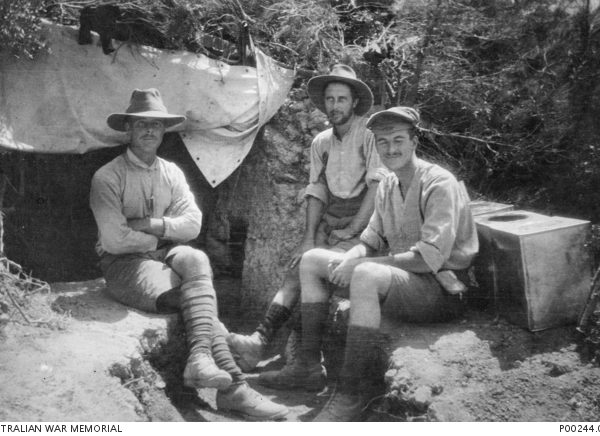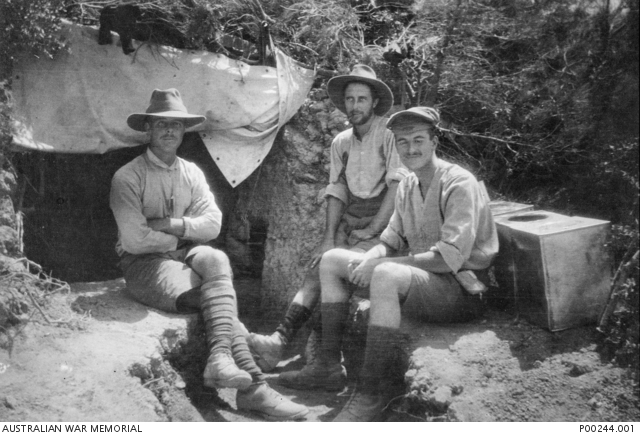

Three Australian officers at Gallipoli, identified from left to right: Lieutenant Roy Kernot of the 1st Division Engineers; Lieutenant Edward Stanley Whitehead of the 3rd Field Company Engineers and Lieutenant Louis Willyama Avery (later MM) of the 1st Division Engineers. The three friends were all associated with the Silverton Tramway Company in Broken Hill and survived the war. image courtesy Australian War Memorial P00244.001
Avery, Louis Willyama – October 1917
October 1st.
Left for work at 4.30 a.m. Shelling was difficult, plenty of mustard gas & it took a great amount of mental persuasion to drive the cowardly body on & on & still on until we reached our job at Westock…It is a battle between a frail body wanting to hide or run & the mastery of a determined brain which drives you on. The dull pain felt in the stomach, the strain of every nerve to breaking point feels like hot wires & the constant swallowing, to say nothing of the noises in your head. Jumpy, irritable, drawn ashen grey faces, quivering nostrils & bloodshot eyes just mildly describes the appearance of every man. Faltering feet obey the command of that great nerve centre the human brain. How these men depend upon & look to their leader. They dare not suggest taking cover or turning back, but blindly follow the judgement of him who is in charge. For the N.C.O. or officer in charge it is a great responsibility. It is his duty to get through & do the work allotted without losing your man. You have to set a high example of courage which you do not feel, use discretion & make rapid decisions…You are more frightened of the opinion of your men. He is a dope, chicken hearted, or does not know what he is doing are examples of what a leader would rather die than be accused of… My promotion to full Corporal has been confirmed.
Oct 2nd.
…had a bad time from moustard gas today & a number of us are affected in the throat & eyes. My throat is particularly bad at present. It has made many of us feel sick lately & some are sick. It is always lying about in the low country. We have to be careful not to walk near the places where the gas shells fall as it would eat your boots off your feet. You must not let it come in contact with the flesh. Same effect as the boots…
Oct 3rd.
My day off today. Even one day bucks you up wonderfully. However I am not feeling the strain quite so much now nor do I feel so tired. My nerves are terribly on edge though. I hate to admit that the explosion of a heavy shell miles away causes me to jump. We are all much the same…I am a mass of nerves, the more you get the worse you become. New troops stand up to it well for a while until they become nervous wrecks like ourselves. Many cannot stand it & have to be sent away.
Oct 4th.
…It was an awful job reaching our position. Rain had turned the country into a huge swamp. We were lost to the left of Polygon Veld. We waited under shell fire till our section officer went away to find our where we were to go, & rain started again. Mr. Price. our section officer returned minus a finger. It appears he & the guide had wandered into no-mans-land. Hearing voices they stopped to listen. They were Germans, so they returned, but walked into one of our posts. The sentry who was a Jock, fired first & asked questions after.
Oct 10th.
The Sergeant has taken the Section out today while I remain in camp. This is a good arrangement & we should soon feel fit again. The idea is not to risk the N.C.O’s by sending them all out together. It is an awful long way out to work, & the weather is rotten. Better to stay out there all the time.
Oct. 14th.
The Company is away loading material & transporting it to Westock. They found Menin Road closed for repairs so they had to return. An example of marvelous organisation & co-operation…
Oct 17th.
…Fritz was fairly quiet & we got through a fair amount of work. Returned at 10.30 & it was a nice sunny day for a change. Saw a good dog fight in the air today. 8 Huns were scrapping enough of our planes to eat them, yet our fellows adopted a tactical retreat as the army calls it. I still wonder who has master of the air. Their planes seem faster than ours & this gives them an opportunity to have things pretty well their own way. A big Gotha bomber was brought down this morning, crashing in the vicinity of our camp.
Oct 18th.
…Russia does nor appear capable of preventing the German advance. Looks very serious. Late tonight I was advised that my leave had been granted for Paris. What Luck!
Oct 26th.
…I went to the Orderly Room Sergeant’s dugout & woke him up. He blinked twice & said “Congratulations Lou old boy, you deserved it”. I enquired “What for Congrats”. He told me to have a look at the notice board. “Have I got my orders to go to the Royal Engineers officers school”? “Go & look at the notice “ he said, so off I went puzzled to see for myself.
Lo & behold I had been awarded The Military Medal, & the notice contained congratulations by Divisional Company Commanders. This was a great though pleasant shock & was so unexpected…
Oct 27th
…Did some walking today, putting some petrol in the water to stir up the enemy. This is a reprisal of an asphyxiating nature for repeated attacks on neutral territory. Jerry bombed near our camp tonight. Nice people!
Oct 29th.
Was up early & called the Section. I set off for Hd. Qrs. at Ypres & was paraded before Col. Martin punctually at 9 o’clock. He shook hands with a Corporal, & then took me to interview General Walker. He enquired where I was educated etc. & suddenly brightened up & said, “Oh, I see you are one of my old boys” noting the brass A’s on my colour patch. (A for Anzac). He wanted to know if I saw him on Gallipoli. I said yes & it appeared to please him. As a matter of fact I had many times. Outside, after the interview I met Capt Allen Dean, from Adelaide, now Adjutant of 1st Division Hd. Qrs. We had a long yarn, during which he told me that it was pretty certain that I would get my Commission, & it might be direct.

